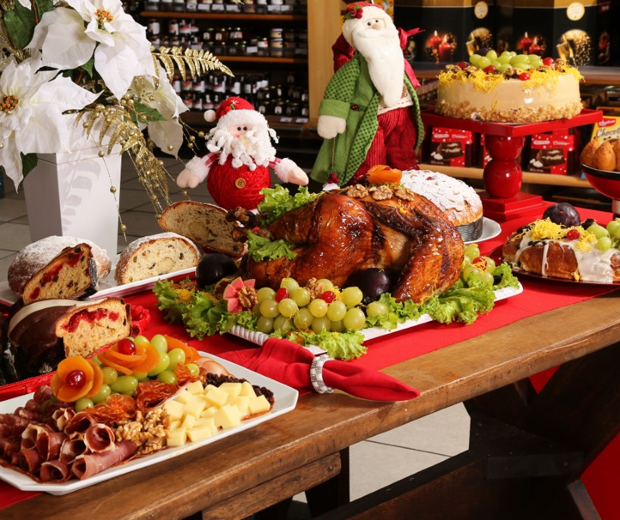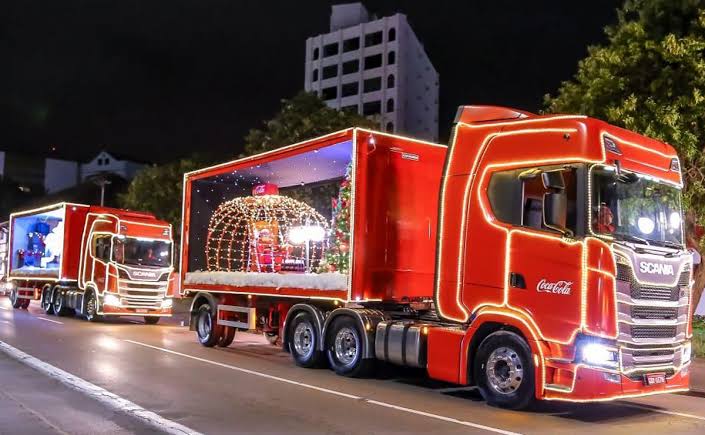Brazilians usually celebrate Christmas in the evening before Christmas Day, when dinner is served with the traditional centerpieces of the country’s buffet table: roast turkey, Chester (a poultry roast looking a bit like an overgrown chicken, labeled by a national meat-packing firm), or chicken itself in this order, from the most privileged social classes to the humblest. And the panettone cannot miss it!

Roast poultry and panettone can not miss the Brazilian Christmas dinner.
The panettone begins to arrive in the supermarkets in November and is taken away right from the start. Brazilians appreciate panettone, which can also be found in its Chocotone version (with chocolate), and in a variety of brands and prices for all pockets and consumer profiles. It is interesting to note that Brazilians use gift porters, janitors, valets, and housekeepers with panettones at Christmas.
This year, Christmas will be celebrated on Wednesday and the eve on Tuesday. Traditionally in Brazil, the trade closes at 6 pm on the 24th, meaning that consumers will have Monday to make their last-minute purchases. Brazilian consumers usually leave many Christmas shopping items for the last minute, looking for deals or trying to spend less. The eve of eve makes the retail’s joy.
The majority of Brazilian families are Christian. Therefore misses are more attended in December to celebrate the birth of Jesus Christ in family union and reconciliation while charity is experienced through the love for the neighbor and solidarity, a feature that distinguishes Brazilians from many other peoples. It is not by chance that frequent campaigns enhancing donations of foodstuffs are carried out in December.
For other Brazilians, the central interest is the extended holiday. Especially for those who choose to stay in the country, the season matches the tropical summertime. Many companies are sometimes off for up to 15 days during the Christmas’ and New Year’s season; crowded airport lounges and coastal access highways can always be expected by those who take the opportunity to travel. In general, Brazilian consumers spend Christmas with their families, but leave their homes to travel on New Year’s Eve, and, again, their favorite destination is the coast.
As Christmas is celebrated at the end of the year, December is the month of get-togethers. Corporate collaborators traditionally commemorate the date with parties and often gift their co-workers chosen by chance through a game called “secret friend.” Everyone is invited to describe his/her “secret friend’s” qualities and flaws, never mentioning his or her name so that all may figure out who is being described. At the moment of revelation, the secret friend receives the gift, and the game goes on with the next colleague. Thus, all participants present and are presented. Businesses already stipulate rules on the type of gift and price range to prevent anyone from getting a gift that is much more expensive or much cheaper than the gift they bought.

Children receive more gifts than adults. In many families, only children get Christmas gifts. Santa Claus inhabits the imagination of children as it is everywhere: in the malls, in the hypermarkets, in the shopping streets. And Coca-Cola usually does Christmas promotions in several Brazilian cities with lit and decorated Truck Caravan. In one of the trucks – specially decorated – travels Santa Claus and also the polar bear character of the Coca-Cola advertising campaigns. Interestingly, despite the summer tropical climate beginning in December, Santa’s costumes are the same as in the movies. Many grandpas who have temporary jobs to stage the “good old man” sweat under the hot, heavy suits.
Brazilians have the habit of installing a Christmas tree at home, and very often, gifts are placed under the tree in advance – especially where there are children. But as many purchases are left to the last minute, the custom is to place the gifts under the tree on Christmas Eve.
The Brazilian consumer has a peculiar behavior regarding Christmas shopping: a few weeks before, the consumer says he intends to spend less than in the previous years, that he will buy small souvenirs, and will control his credit card so as not to carry the financial burden into the coming year. Any promotional action fifteen days before Christmas arouses little interest to Brazilian consumers.
But this rationalism decreases as the date approaches. Rational thinking gets sidetracked, and Brazilian consumers surrender to emotional trends. The result is that the credit card’s available limit will be depleted on the eve of Christmas Eve. It is the day of the year that Brazilians most buy on impulse.
The Brazilian cannot resist unmissable promotions (discounts over 25% of the regular price). Aware of this, retail chains reserve price promotions for the eve of eve, when consumers let emotions guide themselves.
It must be understood that in Brazil, Christmas advertising campaigns have a very high emotional appeal. The consumer resists as much as he can. But that widespread stress caused by too many people going shopping (lines before stores, crowded parking lots, Christmas carols, flashing lights on Christmas trees in the store windows, etc.) and the need to accommodate all the extra spending on the small household budget ends up by triggering latent emotional contents. In the final stretch, the Brazilian consumer gives in. The rational, restrained consumer who would only buy souvenirs and prepare a modest supper leaves the scene. There arises the emotional version of this same consumer who buys far more than he had initially planned, who fills the supermarket cart and the fridge to the limit of the capacity and brings presents for those who – initially – was off the list.
Christmas seems to give a license for rampant consumption. In a country with high social inequalities, an alibi to overindulge with shopping may well be appropriate.
